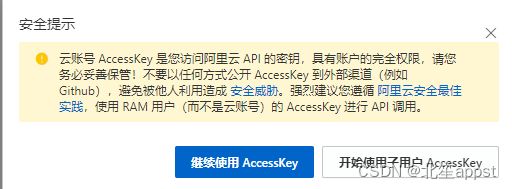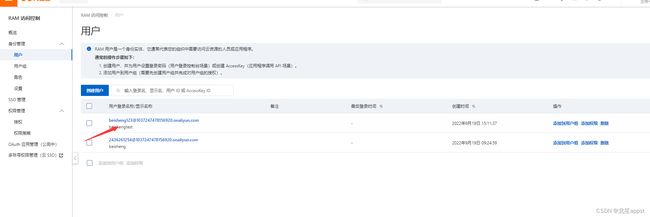SpringBoot+Vue图片上传到阿里云OSS
1.配置阿里云OSS
https://oss.console.aliyun.com/overview

点击工作台,左边菜单栏Bucket列表,创建Bucket
点击右上角账户

点击AccessKey管理

选择开始使用子用户,创建用户
创建成功后会显示你的AccessKey ID 和 AccessKey Secret,复制这两个自己保存一下,
可以看到刚才创建的用户,点击添加权限,进行设置权限
选择AliyunOSSFullAccess,即可赋予当前子用户OSS操作的所有权限
然后配置一下阿里云OSS跨域设置(这个是当前端访问阿里oss上传图片接口的时候,会出现跨域,这里没用到,用的是后端,但是也配一下)
https://blog.csdn.net/omage/article/details/122059938
最后就配置完了
2.导入OSS依赖
<!--阿里云OSS-->
<dependency>
<groupId>com.aliyun.oss</groupId>
<artifactId>aliyun-sdk-oss</artifactId>
<version>3.10.2</version>
</dependency>
3.配置配置文件
# 设置最大支持文件大小
spring.servlet.multipart.max-file-size=100MB
spring.servlet.multipart.max-request-size=1000MB
# endPoint
aliyun.endPoint=这里填写你的endPoint
# Bucket
aliyun.urlPrefix=这里填写你的urlPrefix
# accessKey Id
aliyun.accessKeyId=这里填写你的accessKeyId
# accessKey Secret
aliyun.accessKeySecret=这里填写你的accessKeySecret
# BucketName
aliyun.bucketName=这里填写你的BucketName
# 设置上传文件后的前缀,也可以忽略
aliyun.fileHost=D:/image
4.后端代码(这里的R是统一返回值)
R
package cn.bgs.utils;
import io.swagger.annotations.ApiModelProperty;
import lombok.Data;
import java.util.HashMap;
import java.util.Map;
@Data
public class R {
@ApiModelProperty(value = "是否成功")
private Boolean success;
@ApiModelProperty(value = "返回码")
private Integer code;
@ApiModelProperty(value = "返回消息")
private String message;
@ApiModelProperty(value = "返回数据")
private Map<String, Object> data = new HashMap<String, Object>();
private R(){}
public static R ok(){
R r = new R();
r.setSuccess(true);
r.setCode(ResultCode.SUCCESS);
r.setMessage("成功");
return r;
}
public static R error(){
R r = new R();
r.setSuccess(false);
r.setCode(ResultCode.ERROR);
r.setMessage("失败");
return r;
}
public R success(Boolean success){
this.setSuccess(success);
return this;
}
public R message(String message){
this.setMessage(message);
return this;
}
public R code(Integer code){
this.setCode(code);
return this;
}
public R data(String key, Object value){
this.data.put(key, value);
return this;
}
public R data(Map<String, Object> map){
this.setData(map);
return this;
}
}
config
/**
* @Auther: csp1999
* @Date: 2020/10/31/13:33
* @Description: 阿里云 OSS 基本配置
*/
// 声明配置类,放入Spring容器
@Configuration
// 指定配置文件位置
@PropertySource(value = {"classpath:application.properties"})
// 指定配置文件中自定义属性前缀
@ConfigurationProperties(prefix = "aliyun")
@Data// lombok
@Accessors(chain = true)// 开启链式调用
public class AliyunOssConfig {
private String endPoint;// 地域节点
private String accessKeyId;
private String accessKeySecret;
private String bucketName;// OSS的Bucket名称
private String urlPrefix;// Bucket 域名
private String fileHost;// 目标文件夹
// 将OSS 客户端交给Spring容器托管
@Bean
public OSS OSSClient() {
return new OSSClient(endPoint, accessKeyId, accessKeySecret);
}
}
controller
/**
* @Auther: beisheng
* @Date: 2020/10/31/16:40
* @Description: OSS 文件上传controller
*/
@Api(description = "阿里云OSS文件上传、下载、删除API")
@CrossOrigin
@RequestMapping("api/pri/file")
@RestController
public class OssFileController {
@Autowired
private FileUploadService fileUploadService;
/*
* 文件上传api
* @param: file
* @return: com.alibaba.fastjson.JSONObject
* @create: 2020/10/31 17:35
* @author: beisheng
*/
@ApiOperation(value = "文件上传")
@PostMapping("upload")
public R upload(@RequestParam("file") MultipartFile file) {
if (file != null) {
oss returnFileUrl = fileUploadService.upload(file);
if (returnFileUrl.equals("error")) {
return R.error("图片类型不符合");
}
return R.ok("图片上传成功").data("fileUrl",returnFileUrl);
} else {
return R.error("图片上传失败");
}
}
/*
* 文件下载api
* @param: fileName
* @param: response
* @return: com.alibaba.fastjson.JSONObject
* @create: 2020/10/31 17:35
* @author: beisheng
*/
@ApiOperation(value = "文件下载")
@GetMapping(value = "download/{fileName}")
public R download(@PathVariable("fileName") String fileName, HttpServletResponse response) throws Exception {
String status = String.valueOf(fileUploadService.download(fileName, response));
if (status.equals("error")) {
return R.error("文件下载失败");
} else {
return R.ok("文件下载成功");
}
}
/*
* 文件删除api
* @param: fileName
* @return: com.alibaba.fastjson.JSONObject
* @create: 2020/10/31 17:35
* @author: beisheng
*/
@ApiOperation(value = "文件删除")
@GetMapping("/delete/{fileName}")
public R DeleteFile(@PathVariable("fileName") String fileName) {
String status = String.valueOf(fileUploadService.delete(fileName));
if (status.equals("error")) {
return R.error("文件删除失败");
} else {
return R.ok("文件删除成功");
}
}
service实现类
/**
* @Auther: beisheng
* @Date: 2020/10/31/14:30
* @Description: 文件上传Service (为节省文章中的代码篇幅,不再做接口实现类处理)
*/
@Service("fileUploadService")
public class FileUploadServiceImpl implements FileUploadService {
// 允许上传文件(图片)的格式
private static final String[] IMAGE_TYPE = new String[]{".bmp", ".jpg",
".jpeg", ".gif", ".png"};
@Autowired
private OSS ossClient;// 注入阿里云oss文件服务器客户端
@Autowired
private AliyunOssConfig aliyunOssConfig;// 注入阿里云OSS基本配置类
/*
* 文件上传
* 注:阿里云OSS文件上传官方文档链接:https://help.aliyun.com/document_detail/84781.html?spm=a2c4g.11186623.6.749.11987a7dRYVSzn
* @param: uploadFile
* @return: string
* @create: 2020/10/31 14:36
* @author: beisheng
*/
@Override
public oss upload(MultipartFile uploadFile) {
// 获取oss的Bucket名称
String bucketName = aliyunOssConfig.getBucketName();
// 获取oss的地域节点
String endpoint = aliyunOssConfig.getEndPoint();
// 获取oss的AccessKeySecret
String accessKeySecret = aliyunOssConfig.getAccessKeySecret();
// 获取oss的AccessKeyId
String accessKeyId = aliyunOssConfig.getAccessKeyId();
// 获取oss目标文件夹
String filehost = aliyunOssConfig.getFileHost();
// 返回图片上传后返回的url
String returnImgeUrl = "";
oss oss = new oss();
// 校验图片格式
boolean isLegal = false;
for (String type : IMAGE_TYPE) {
if (StringUtils.endsWithIgnoreCase(uploadFile.getOriginalFilename(), type)) {
isLegal = true;
break;
}
}
if (!isLegal) {// 如果图片格式不合法
return null;
}
// 获取文件原名称
String originalFilename = uploadFile.getOriginalFilename();
// 获取文件类型
String fileType = originalFilename.substring(originalFilename.lastIndexOf("."));
// 新文件名称
String newFileName = UUID.randomUUID().toString() + fileType;
// 构建日期路径, 例如:OSS目标文件夹/2020/10/31/文件名
String filePath = new SimpleDateFormat("yyyy/MM/dd").format(new Date());
// 文件上传的路径地址
String uploadImgeUrl = filehost + "/" + filePath + "/" + newFileName;
oss.setNewFileName(newFileName);
// 获取文件输入流
InputStream inputStream = null;
try {
inputStream = uploadFile.getInputStream();
} catch (IOException e) {
e.printStackTrace();
}
/**
* 下面两行代码是重点坑:
* 现在阿里云OSS 默认图片上传ContentType是image/jpeg
* 也就是说,获取图片链接后,图片是下载链接,而并非在线浏览链接,
* 因此,这里在上传的时候要解决ContentType的问题,将其改为image/jpg
*/
ObjectMetadata meta = new ObjectMetadata();
meta.setContentType("image/jpg");
//文件上传至阿里云OSS
ossClient.putObject(bucketName, uploadImgeUrl, inputStream, meta);
/**
* 注意:在实际项目中,文件上传成功后,数据库中存储文件地址
*/
// 获取文件上传后的图片返回地址
returnImgeUrl = "http://" + bucketName + "." + endpoint + "/" + uploadImgeUrl;
oss.setUploadImgeUrl(uploadImgeUrl);
oss.setReturnImgeUrl(returnImgeUrl);
return oss;
}
/*
* 文件下载
* @param: fileName
* @param: outputStream
* @return: void
* @create: 2020/10/31 16:19
* @author: beisheng
*/
@Override
public R download(String fileName, HttpServletResponse response) throws UnsupportedEncodingException {
// // 设置响应头为下载
// response.setContentType("application/x-download");
// // 设置下载的文件名
// response.addHeader("Content-Disposition", "attachment;fileName=" + fileName);
// response.setCharacterEncoding("UTF-8");
// 文件名以附件的形式下载
response.setHeader("Content-Disposition", "attachment;filename=" + URLEncoder.encode(fileName, "UTF-8"));
// 获取oss的Bucket名称
String bucketName = aliyunOssConfig.getBucketName();
// 获取oss目标文件夹
String filehost = aliyunOssConfig.getFileHost();
// 日期目录
// 注意,这里虽然写成这种固定获取日期目录的形式,逻辑上确实存在问题,但是实际上,filePath的日期目录应该是从数据库查询的
String filePath = new DateTime().toString("yyyy/MM/dd");
String fileKey = filehost + "/" + filePath + "/" + fileName;
// ossObject包含文件所在的存储空间名称、文件名称、文件元信息以及一个输入流。
OSSObject ossObject = ossClient.getObject(bucketName, fileKey);
try {
// 读取文件内容。
InputStream inputStream = ossObject.getObjectContent();
BufferedInputStream in = new BufferedInputStream(inputStream);// 把输入流放入缓存流
ServletOutputStream outputStream = response.getOutputStream();
BufferedOutputStream out = new BufferedOutputStream(outputStream);// 把输出流放入缓存流
byte[] buffer = new byte[1024];
int len = 0;
while ((len = in.read(buffer)) != -1) {
out.write(buffer, 0, len);
}
if (out != null) {
out.flush();
out.close();
}
if (in != null) {
in.close();
}
return R.ok("成功");
} catch (Exception e) {
return R.error("失败");
}
}
/*
* 文件删除
* @param: objectName
* @return: java.lang.String
* @create: 2020/10/31 16:50
* @author: beisheng
*/
@Override
public R delete(String fileName) {
// 获取oss的Bucket名称
String bucketName = aliyunOssConfig.getBucketName();
// 获取oss的地域节点
String endpoint = aliyunOssConfig.getEndPoint();
// 获取oss的AccessKeySecret
String accessKeySecret = aliyunOssConfig.getAccessKeySecret();
// 获取oss的AccessKeyId
String accessKeyId = aliyunOssConfig.getAccessKeyId();
// 获取oss目标文件夹
String filehost = aliyunOssConfig.getFileHost();
// 日期目录
// 注意,这里虽然写成这种固定获取日期目录的形式,逻辑上确实存在问题,但是实际上,filePath的日期目录应该是从数据库查询的
String filePath = new DateTime().toString("yyyy/MM/dd");
try {
/**
* 注意:在实际项目中,不需要删除OSS文件服务器中的文件,
* 只需要删除数据库存储的文件路径即可!
*/
// 建议在方法中创建OSSClient 而不是使用@Bean注入,不然容易出现Connection pool shut down
OSSClient ossClient = new OSSClient(endpoint,
accessKeyId, accessKeySecret);
// 根据BucketName,filetName删除文件
// 删除目录中的文件,如果是最后一个文件fileoath目录会被删除。
String fileKey = filehost + "/" + filePath + "/" + fileName;
ossClient.deleteObject(bucketName, fileKey);
try {
} finally {
ossClient.shutdown();
}
System.out.println("文件删除!");
return R.ok();
} catch (Exception e) {
e.printStackTrace();
return R.error();
}
}
}
pojo
@Data
public class oss {
//带文件夹的文件名 D:/image/2022/09/19/d174a539-c9a8-4c86-94c4-660bd6693cf3.jpg
private String uploadImgeUrl;
//文件名称 d174a539-c9a8-4c86-94c4-660bd6693cf3.jpg
private String newFileName;
// 文件访问地址 http://edu-2004-0926.oss-cn-beijing.aliyuncs.com/D:/image/2022/09/19/da8da243-3095-4ef2-8a9a-2be232a482ef.jpg
private String returnImgeUrl;
}
5.前端代码
<template>
<div>
<el-upload
class="avatar-uploader"
action="http://localhost:8080/renren-fast/api/pri/file/upload"
:show-file-list="false"
:on-success="handleAvatarSuccess"
:before-upload="beforeAvatarUpload">
<img v-if="tableData.avator" :src="tableData.avator" class="avatar" style="width: 200px;height: 200px">
<i v-else class="el-icon-plus avatar-uploader-icon"></i>
</el-upload>
<i class="el-icon-delete" @click="deleteImg"></i>
<i class="el-icon-download" @click="insertImg"></i>
</div>
</template>
<script>
export default {
data() {
return {
tableData:{
//图片访问地址
avator:'',
//图片名称
delImg:'',
}
};
},
methods: {
//删除图片
deleteImg(){
this.$http({
url: this.$http.adornUrl(`/api/pri/file/delete/${this.tableData.delImg}`),
method: 'get',
params: this.$http.adornParams()
}).then(res=>{
this.$message.success("图片删除成功!")
})
},
//下载图片
insertImg(){
this.$http({
url: this.$http.adornUrl(`/api/pri/file/download/${this.tableData.delImg}`),
method: 'get',
params: this.$http.adornParams()
}).then(res=>{
this.$message.success("图片下下载成功!")
})
},
//文件上传成功
handleAvatarSuccess(res) {
this.$message.success("图片上传成功!")
this.tableData.avator = res.fileUrl.returnImgeUrl;
this.tableData.delImg= res.fileUrl.newFileName;
alert(this.tableData.delImg)
},
//限制用户上传的图片格式和大小
beforeAvatarUpload(file) {
const isLt2M = file.size / 1024 / 1024 < 10;
if (!isLt2M) {
this.$message.error('上传图片大小不能超过 10MB!');
}
return isLt2M;
}
}
};
</script>
<style lang="scss">
.flex {
display: flex;
}
.flex-1 {
flex: 1;
}
.upload-img {
flex-direction: column;
justify-content: center;
align-items: center;
.el-upload__tip {
text-align: center;
}
}
</style>

